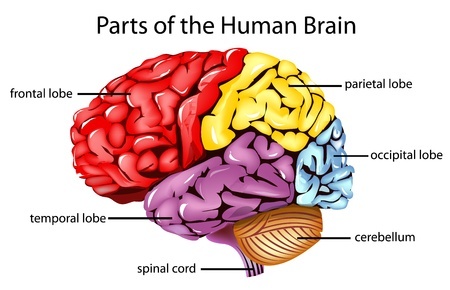
What if I explained to you that it is possible to have a child of divorce in your class who has a sustained attention span and can empathize with other children in the group?
What if I told you that it is possible for the child of trauma to fit into your class and actually be in control of his behavior and in general be a joy to have in your group?
“Not likely!” you say? Understanding the incredible, amazing brain in children of divorce, though, makes it very likely you can have this child in your group. It is very likely that you can create an atmosphere where children who have experienced trauma, such as divorce, can heal, grow, and come to know Christ as their personal Savior.
To create this atmosphere, however, one has to understand the upper level of the brain—the cortex.
Frontal Lobes
It is all about the frontal lobes in their brain. The frontal lobes are the upper level of the brain or the cortex.

As we think about the upper level of the brain, we learn this is the part of the brain we want the child to access. The upper level of the brain (the frontal lobe) is where you find:
- Impulse control
- Empathy
- Working memory
- Sustained attention
- The ability to plan, prioritize, and initiate
- Organization
- The ability to develop ethics, altruism, and compassion
- Time management (Ever notice that single parents are almost always late?)
- Goals and stick-to-it-ness
It is important to create environments where we can nurture the frontal lobe. These are environments where the child sees, feels, and is part of something that emulates a family atmosphere. It is important for the church and church activities and classes to welcome the child of divorce into the church family.
In our church groups, it is important that the leaders be able to give children what they need. These kids need:
- Your love
- Understanding and empathy for what they are experiencing
- The experience of a healthy family-type atmosphere (a church family)
- To feel safe physically and emotionally
- To feel loved and comforted in that love
- To be accepted
For leaders
The upper level of the brain is where we as leaders need to be when working with children of divorce. It is in this level of the brain that you will be an effective leader.
Think about it. Working with some of these children can be a real challenge.
It takes impulse control to keep from getting upset with some of their behaviors. It certainly takes empathy when you need to feel what they are feeling, and you need to put yourself in their place for a few minutes. What must it feel like when you wanted to see your mom, and she didn’t show up for dinner this week or last week—or the past ten weeks?
If you think about it, you can see how important it is to:
- Remember what a child told you three weeks ago the last time he was at church
- Pay attention to each child of divorce
- Plan in advance, prioritizing and initiating projects effectively
- Be organized for every class
- Be on time and prepared in advance
- Be committed to sticking with the child of divorce and be helpful to and serve the child’s family
For the children of divorce
For the children of divorce, we want them to be able to access the upper level of the brain, so they can learn how to process the divorce and move forward with their lives. The child has to be in this state to learn and solve conflicts.
We learn problem solving in a social system. Children of divorce don’t have opportunities to learn this when they are shuffled from home to home or in homes where there is a lot of fighting or when they live with a single parent who is too stressed to pay much attention to the needs of the children.
While not all single parents are like this, many who are just experiencing the heartbreak of divorce live in the emotional part of their brain. Plus, many children of divorce are isolated and left alone after school—zoning out in front of a TV, playing video games, or surfing the Internet.
In the book Think Smart: A Neuroscientist’s Prescription for Improving Your Brain’s Performance, Richard Restak says,
“I’ve found that many prisoners, especially those serving time for violent crimes, suffer from deficiencies in frontal lobe function. They can’t plan their lives or control either their emotions or their behaviors.
“If the frontal lobes are not nurtured and developed, … then we as a society can expect to pay dearly in terms of more crime, broken homes, drug use and violence.” (Richard Restak, 1994)
If you’ve read much research on children of divorce, you already know that children of divorce have higher chances of ending up incarcerated than children in two-parent homes. Restak’s comments should send shock waves through the church realm if we are serious about ministering to the children of divorce in our children’s programs.
Did the phrase “broken homes” jump out at you? It did to me. What if your church could be one of the tools that help kids develop and nurture their frontal lobes?
Only when these children can access the higher level of the brain, the frontal lobe, will you be able to help them process and heal from the breakup of their once-intact family.
It is in this state that they will move forward in life and learn to solve problems. They will be able to make healthy lifestyle choices. They will develop an understanding that Jesus Christ can be their personal Savior. And they will be able to learn and contribute to their world and to your class.
This article is updated and adapted from an article originally published on the Kids & Divorce blog on June 3, 2014.
DC4K blogs posts are great to use for training children’s leaders and volunteers and they are free. Subscribe to the DC4K blog here.
Want to learn more about how to start a DivorceCare for Kids group for the hurting children in your community? Click here.
Did you know DC4K blog articles are on Pinterest? Divorce & Kids, Children’s Pastors, Single Parents, etc. It’s all there. Check it out here
Follow Linda on Twitter, dc4klinda










Hurray for sowing this seed of wealth for children of divorce and loss of parent as a result of death. Hurray for your ministry!
Thank you Twylla. I think the information is valuable and we all need to learn more about the brain in these kid who have experienced a trauma
Pingback: DC4K » The incredible, amazing brain in kids of divorce Part 7: The heart and head